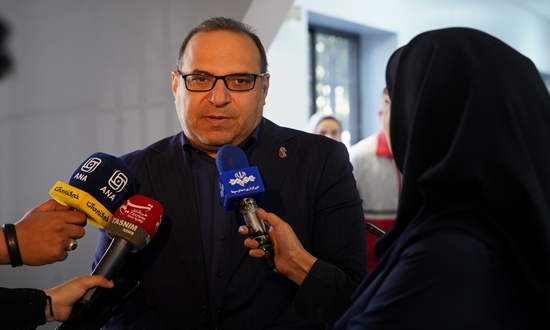Insights from the 5th Arbaeen Health Congress
Dr. Tavakoli Highlights the Role of Artificial Intelligence in Enhancing Health Services

Dr. Tavakoli, President of the Iran University of Medical Sciences (IUMS), emphasized the significance of utilizing artificial intelligence, developing scientific protocols, and fostering interdepartmental coordination at the opening ceremony of the 5th Arbaeen Health Congress. This congress aims to conduct a comprehensive scientific examination of health, hygiene, and service management within the context of the world's largest religious gathering, ultimately striving to improve the health of pilgrims.
In his opening remarks on November 1 at the Razi Conference Center, attended by both domestic and international guests, Dr. Tavakoli expressed pride in inaugurating the Arbaeen Health Congress. He noted that this scientific event has evolved over the years to focus on the health aspects associated with the Arbaeen pilgrimage, highlighting its profound cultural, social, and religious implications for society. He stressed the necessity of addressing these health aspects through a scientific lens.
Dr. Tavakoli stated, "This congress provides a vital opportunity for a scientific and empirical review of managing accidents, incidents, crises, and health services along the Arbaeen pilgrimage route." He underscored the importance of the country's health system in delivering coherent and safe services through interdisciplinary collaboration, particularly in partnership with the Red Crescent Society and the Ministry of Health. A primary objective of the congress is to scientifically analyze challenges and propose solutions to enhance health and medical services for pilgrims.
Regarding the specialized themes of the congress, Dr. Tavakoli highlighted discussions on the integration of new technologies, including artificial intelligence, the enhancement of health monitoring systems, relief services, and the training of health workers along the Arbaeen pilgrimage route. He noted that these discussions aim to make service delivery more scientific and precise.
Dr. Tavakoli emphasized, "One of the most significant outcomes of this congress is the establishment of a platform for compiling scientific documentation and health protocols specific to Arbaeen. This initiative will ensure that medical and health services are delivered based on scientific evidence and established standards, particularly in crisis management, relief efforts, and disease prevention." He also addressed the importance of training and updating guidelines, stating, "To effectively utilize the findings from research and scientific literature, we must develop guidelines, specialized training programs, and updated health protocols. This will empower service providers and relief teams to assist pilgrims with greater knowledge and preparedness."
In conclusion, Dr. Tavakoli expressed gratitude to all participants and stakeholders involved, asserting that the Arbaeen Health Congress could serve as a model for collaboration among various agencies and as a platform for informed decision-making in the realm of pilgrim health. He expressed hope that the outcomes of this congress would lead to improved health services for Arbaeen in the years to come.


comment